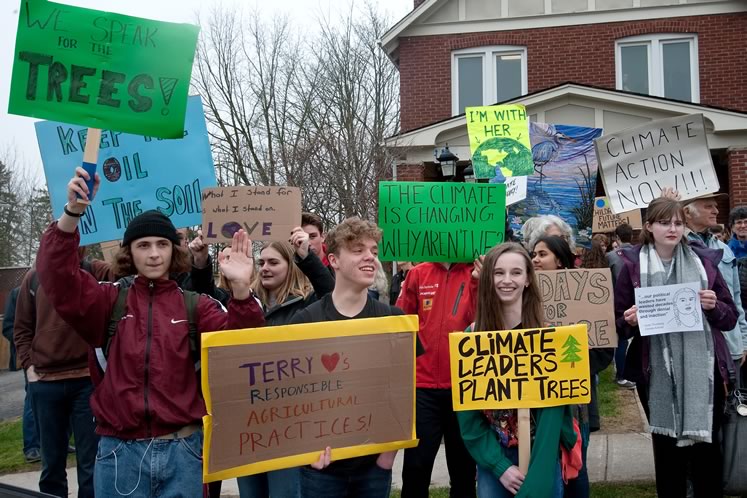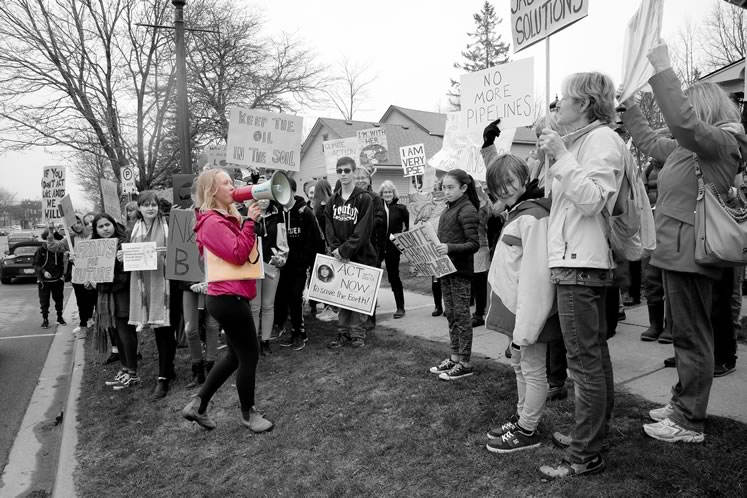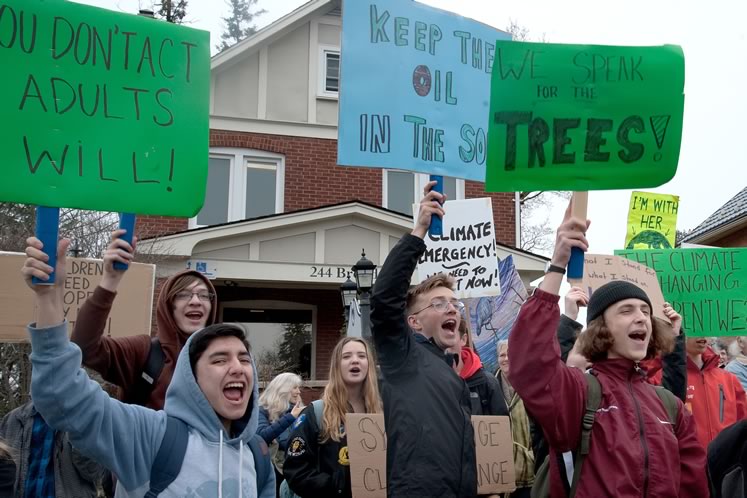Climate Change and the Young
“We the young have started to move.” Youth here and around the world raise a battle cry for action on climate change.
After spending a good part of my life encouraging action on climate change locally, nationally and internationally, I gave up. I realized I risked hari-kari if I had to initiate another emission-reducing project or write another article about climate change. No one wants to hear depressing news. I didn’t want to hear depressing news. I quit my job as editor of Canada’s environmental magazine and started leading canoeing and kayaking trips on the French River, eventually creating a series of hiking guides. I wanted more joy in my life. I reasoned that my efforts to get people into nature could do as much to raise awareness as woeful stories about animal extinctions, dying trees, gutless government policy, or the end of humankind. In truth, I’d lost hope.
Then Greta Thunberg happened.
Stories about a 15-year-old from Sweden who began striking for action on climate change permeated my inner climate activist psyche – the one I thought was hermetically sealed. In his 2019 book Walking: One Step at a Time, Erling Kagge wrote, “Marches by demonstrators are a red thread running throughout the history of advocating for better rights for workers, women and minorities.” And here was Greta, still a child, driven to act so kids her age and younger would have a future.
Earlier this year Greta told a roomful of adults, “I don’t want you to be hopeful. I want you to panic. I want you to feel the fear I feel every day. And then I want you to act.”
On August 20 last year, Greta wrote “SKOLSTREJK FÖR KLIMATET” (School Strike for Climate) in large block letters on a piece of white cardboard, skipped class and sat down on the hard, cold cobblestone sidewalk all by herself. She propped her protest sign against Sweden’s main parliamentary building (breaking the law in the process – school attendance is mandatory in Sweden). In front of her, the grade niner laid out a handful of pamphlets that stated her reasons for refusing to attend school. She accused adults of being lousy role models whose inaction on climate change indicated they didn’t “give a shit” about her future. So, she reasoned, what was the point of going to school?
Greta vowed to continue striking every Friday until the Swedish government aligned its climate change policy with the Paris Agreement, a provision of the UN Convention on Climate Change. Approved by consensus in 2015, the Paris Agreement’s goal is to save humankind by keeping the increase in global average temperatures below 2C above pre-industrial levels, recommending it would be prudent to limit the increase to 1.5C. Scientists warn that we have until 2030 to wrestle control of global greenhouse gas emissions or risk irreversible catastrophic results. Sweden, like Canada, and more than 180 nations have ratified the Paris Agreement. Yet only about half a dozen of the 195 countries that signed the agreement have implemented plans to meet its terms – neither Canada nor Sweden are among them.
Since that first lonely strike less than a year ago, Greta has been inspiring people the world over with her plain-spoken presentations. She has instigated and participated in countless climate strikes and protests that have attracted hundreds of thousands of people across the globe and of all ages, but especially students.
Now 16, Greta has spoken in Britain’s Houses of Parliament, the EU parliament and at the Climate Change conference in Poland. She’s given a TEDx talk, and earlier this year she attended the World Economic Forum in Davos. In contrast to the fossil fuel gulping private jets that transported many of the who’s who of the business world, Greta arrived by train, one of the most climate-friendly modes of transportation. It took her 32 hours. Time magazine has named her one of the world’s 100 most influential people in 2019, and the Norwegian parliament has nominated her for the Nobel Peace Prize.
The pig-tailed youngster with the penetrating gaze and a form of autism known as Asperger’s syndrome seems an unlikely climate change crusader, but she’s a hero for thousands, including Olivia Rowan. A Grade 10 student at Orangeville District Secondary School, Olivia, like her mentor, is not someone you’d expect to skip school to protest anything. She says, “I’m a really academic person. It’s really hard for me to leave school.” But leave school this rosy-cheeked, blue-eyed blonde has done.

Protesters at a recent local climate strike. Photo by Rosemary Hasner / Black Dog Creative Arts.
The first time Olivia skipped class to strike (rather than strike during her lunch period) was on April 12. Her youthful presence inspired the 20 or so hearty souls who have been protesting every Friday since January outside MP David Tilson’s office in Orangeville. Members of Climate Change Action Dufferin-Caledon, these mostly grey-haired protesters have withstood the cold, the snow and the rain, not to mention belching greenhouse gas emissions from myriad cars. Like me, they’re inspired by Greta. Asked why she is striking, former Green Party candidate Nancy Urekar reiterates a reason familiar to two generations of climate activists: “Because otherwise someday my kids and grandkids will say, ‘You knew it was coming and you did nothing.’ ”
Fair enough. But Greta, Olivia and their peers are those grandkids. In 2030, the predicted date of no return, Greta will be 27, Olivia will be 26. For them the future is not a “someday” abstraction. It is at hand, and they are raising their collective voice and declaring “J’accuse!” Or as a large banner hanging from a bridge in Berlin during one Friday strike succinctly put it: “Worst. Ancestors. Ever.”
Olivia can’t comprehend why “corporations and governments aren’t doing anything even though it’s the fate of humanity on the line. And they keep on doing nothing. You’d think it would be common sense [to do something].” At an age when I was full of youthful optimism about what lay ahead of me, Olivia says she’s sad. “I love working with kids,” she says, but “when I see a pregnant woman, I think about that child …”
Following Greta’s lead, Olivia has decided to give hope a pass and jump to action. As a member of the Environment Club at ODSS, she is among a handful of young climate activists who are still too young to vote, but who are determined to influence those who can. “Government has the tools, such as a carbon tax, to bring about change,” says Tessa Pugsley, one of the ODSS activists. Tessa, Olivia and their friends won’t be able to vote in the federal election this fall, but watch out next time around when these teenagers will be casting ballots.
Unlike so many of their parents and grandparents, these students are listening to the world’s most eminent scientists and their increasingly dire warnings about a climate crisis. The students recognize there may be an economic cost to a greener economy, but believe governments have no choice but to leave oil in the ground and get on a climate-friendly path. For now, however, political decisions remain in the hands of adults, many of them baby boomers grown long in the tooth, who put short-term economic considerations ahead of the fate of the planet.
In Davos, Greta told the audience, “Some people, some companies, some decision-makers in particular, have known exactly what priceless values they have been sacrificing to continue making unimaginable amounts of money. And I think many of you here today belong to that group of people.” Says Olivia, “The only thing standing in our way is greed, power, money, control and our old ways of living. We have to rethink our way of living if we are to continue living.”
As they watch events unfold in Canada and Ontario, there is little to show that is happening. The climate change battle between some provinces and the federal government is escalating. In Ontario, Doug Ford’s Conservative government has cancelled Ontario’s participation in the cap and trade market that funded so much that could lead to a greener economy. Among other cuts, the government has slashed funding for flood control and eliminated green energy incentives for home owners, electric car rebates and charging stations, and a program to plant 50 million trees. In May the Ford government voted down an NDP motion to declare a climate emergency in Ontario. The move would have aligned the province with a number of countries worldwide and several Canadian cities, many of them hard hit this spring by floods and forest fires. Instead, Ford, a late baby boomer himself, sticks to the usual zero-sum trope. He told the legislature, “We believe in climate change, but we also believe in supporting companies and people to create jobs.”
But it’s not a case of what one gains the other loses. As Nancy Urekar points out, “There are no jobs on a dead planet.” Olivia would like to see support for green technology and an end to investing in big oil companies. She’s come to understand that to be a climate leader she doesn’t have to have all the solutions. “The answers are out there. We’re just not doing them.”
Greta draws a picture of how adults can get going: “It is still not too late to act. It will take a far-reaching vision. It will take courage. It will take fierce, fierce determination to act now, to lay the foundations where we may not know all the details about how to shape the ceiling. In other words, it will take cathedral thinking.”
Dayna Hoekstra is a teacher and eco-leader at Parkinson Centennial Public School in Orangeville. At 32, she is not far removed from Greta, Olivia and their fellow students, and she has faith in their ability to create change. Her school received several awards for its Bag2School challenge, which tackled textile waste, a major source of garbage in landfills. The students collected old clothing, tablecloths, towels and the like. They reused what they could, but ended up with almost two tonnes of textiles, which were recycled rather than sent to landfill.
The students loved the project, she says. “It was the first time I’ve seen kids so motivated for so long. They never complained.” She adds, “This generation is inspired when they have access to the opportunities and tools to achieve a goal. If they have access, there isn’t anything they won’t try to achieve.”
Her enthusiasm is echoed by Belfountain resident Peter Kendall, who runs a youth environmental program called Earth Rangers. With more than 200,000 members between the ages of 6 and 12, he says it is the world’s largest youth conservation group. He’s critical of Canada’s carbon tax – but not for the reason you might expect. He believes it was a mistake to make the carbon tax revenue neutral. He says, “Kids want to be part of something big… [Prime Minister] Trudeau should use the carbon tax to do something big.”
Unfortunately that kind of encouragement is not often evident from the policymakers these kids are trying to reach. Earlier this year, on May 3, about 100 students from ODSS created protest signs and skipped class to join an international student strike, with Olivia and a small group of fellow student organizers urging them on. On a cool, windy, grey day, these youth joined about 100 other protesters in front of Dufferin-Caledon MPP Sylvia Jones’ office on Broadway in Orangeville. For most of the students, this was their first foray into politics.

Inspired by young Swedish activist Greta Thunberg, Orangeville student Olivia Rowan urged on fellow protesters at a recent local climate strike. Photo by Rosemary Hasner / Black Dog Creative Arts.
Although the strikers were told Jones was in her office throughout the two-hour protest, and although the students asked to speak with her, she failed to appear. Later, Jones explained to the media, “They did not make an appointment or notify me of their intention to be outside my office, and I was in meetings all day long.”
While her MPP stayed silent, Olivia says for students the strike caused “a shift in the vibe.” She says it was a good first step, which “let politicians know that [climate change] is an issue that needs to be addressed.” As committed as ever and learning the leadership skills she needs, Olivia advocates joint action to get the job done. She says, “People should stop focusing on money and power and start working together,” adding, “There’s a lot of ego in the world right now.”
The type of action she supports is not aggressive. “Our intention is not to harass or belittle anyone.” Then this budding climate activist reflects, “You can’t be nice about this because it is such an important issue, but you can’t be rude either. It’s a fine line.”
She doesn’t think striking is necessarily the best thing, but she’d “like to think our government cares about us.” So Olivia and her core group of students are doing what teenagers these days do. They are complementing their strikes and letters to politicians with social media. The Orangeville group has set up an Instagram account (@orangevilleclimate) and communicate by Snapchat, reposting the latest from Greta and other climate protestors.

Youth here and around the world raise a battle cry for action on climate change. Photo by Rosemary Hasner / Black Dog Creative Arts.
Old-guard activists like me were guided by the mantra “Think globally, act locally.” This new generation, seemingly born with their thumbs on a keyboard screen, not only think globally, they network globally – connecting instantly with likeminded youth around the world. The crowd of Orangeville students outside Sylvia Jones’ office held electronic hands and marched in virtual solidarity with hundreds of thousands of students around the world. Greta has 1.9 million followers on Instagram.
But some things never change. As Greta has proven, there’s no substitute for a great stump orator, one who can rally a crowd. At the May 3 protest, Olivia used an old-fashioned megaphone to read from an open letter penned by Greta and her fellow student climate activists. It said, “We, the young, have started to move. We are going to change the fate of humanity, whether you like it or not. United we will rise until we see climate justice. We demand the world’s decision-makers take responsibility and solve this crisis.
“You have failed us in the past. If you continue failing us in the future, we, the young people, will make change happen by ourselves. The youth of this world has started to move and we will not rest again.”
Inspiring words. Fighting words. I want to believe them.











Excellent article Nikki.
Thank you.
Annamarie Holtom from Erin, ON on Jul 18, 2019 at 9:37 am |